I settle in known silence,
the poison of the steadfast
thrashing splitting in mute, uneven rhythms—so
barbed and seemingly
boundless for such a commonplace strife;
I endure in dreaming darkly of slumber.
I settle in known silence,
the poison of the steadfast
thrashing splitting in mute, uneven rhythms—so
barbed and seemingly
boundless for such a commonplace strife;
I endure in dreaming darkly of slumber.
America is a construction of hopeful ideals—an American Dream in which citizens are rightly entitled. The Preamble of the Declaration of Independence states: “We hold these truths to be self-evident, that all men are created equal, that they are endowed by their Creator with certain unalienable Rights, that among these are Life, Liberty and the pursuit of Happiness.” The American Dream is a basis for many, if not all, Americans and immigrants who wish to pursue a better life for themselves. We are instructed and inspired to pursue our goals because we have “certain unalienable Rights” to do so. However, the inception of this document was wholly and solely meant to apply to white men. Women and non-white individuals distinctly go unmentioned within the document. Such amendments to the United States Constitution—that is, the Thirteenth (abolishment of slavery) and the Nineteenth (women’s right to vote)—have “corrected” the Declaration of Independence, so that more Americans may pursue this American Dream. Before these amendments, however, the American culture and conscious were fraught with an undeniable racism and sexism. Naturally, texts written during this time should reflect America’s uneasy cognizance about the abject Other. Ruth Bienstock Anolik writes that “…the Gothic recognizes that the monster also has a subjective existence, [and] that the figuring of the human Other as inhuman is itself a monstrous act” (“Introduction” 2). Depriving individuals of the American Dream due to race and sex is just as much a monstrous act as is the initial creation of the Other. The works of Edgar Allan Poe elucidate the uneasiness of the American culture during the mid-19th century. Though the American apprehension toward the Other is never explicitly stated within his stories, one can readily juxtapose America’s cultural climate with the narrators of Poe’s texts to clearly identify this undeniable trepidation. Works such as “The Tell-Tale Heart,” “Berenice,” and “The Black Cat” provide insight into the demons of the mind. Other texts, including Herman Melville’s Moby-Dick (1851) and Steve McQueen’s 12 Years a Slave (2013), also reflect America’s cultural conscious during this time. Specifically looking at the self-deceiving and monomaniacal narrators within these stories will illustrate the prevailing fascination and disgust of the Other; these characters act like grotesque mirrors in which the general uneasiness about the Other shines brightly, revealing the American culture—and the death of the American Dream—in the reflections.
A brief discussion of the core concepts—that is, self-deception and monomania—that pertain to the narrators and characters that exude them, is of paramount importance. Self-deception is self-explanatory: the act of deceiving the self. By deceiving the self of a society’s cultural norms, by barricading the truth, individuals can create a “rational” environment where they can live; it is as if a mask is placed over the mind and an individual can live in a world of delusion. Μονομανία (Greek): μονο, meaning solely, and μανία, meaning mania. Together: monomania. The narrators and characters within Poe’s short stories usually demonstrate this ego-centric monomania, “an exaggerated or fanatical enthusiasm for or devotion to one subject; an obsession, a craze” (“Monomania”). By obsessing over a specific trait, the self-deceiving individual essentially blocks out any rationalism about a subject; this is easily seen within the works of Poe, with stories such as “The Tell-Tale Heart” and “Berenice,” where the narrators’s minds are solely fixed on the body parts of others, and must rid themselves of them in order to survive. The narrator of “The Tell-Tale Heart” is completely fixated on his elderly roommate’s eye; by murdering his roommate, the narrator’s repulsion of the eye is removed, but his subsequent fixation on the cut-up body under the floorboards continues to stir the narrator’s mind. The narrator of “Berenice” is obsessed with the eponymous figure’s teeth, and promptly removes them because it is the singular part of the body that does not decay—a lasting souvenir. The narrator of “The Black Cat,” instead, illustrates a particularly obsessive hatred toward the titular cat, ultimately killing his wife and burying her with the cat to “erase” them from existence. Each of these discriminated against are illustrative of the cultural Other. In Madness in Literature, Lillian Feder writes: “The mind of a mad protagonist or persona of literature discloses the transformation of [familiar cultural traits] into the ultimate sources of psychic disintegration or survival” (xiii). Through Feder’s lens, it becomes clear that the vast majority of Poe’s narrators and characters are deceiving themselves in order to mask the cultural atrocities toward those discriminated against; they must do this to keep their “sanity.” Self-deception and monomania seem to be fully integrated within the American culture. By looking at literature of the American Renaissance, one can determine not only a widespread existence of self-deception and monomania, but how they each play a part in masking the self against the Other. No one does this better than Mr. Poe.
Self-deception and monomania are apparent within Poe’s “The Tell-Tale Heart.” In this short story, an unnamed narrator obsesses over one of the eyes of his elderly roommate, ultimately murdering him in order to rid himself of it forever. The roommate’s vulture-like eye is so repulsive that it keeps the narrator awake at night; he obsesses over the eye. His monomania is implied from the onset. Poe writes that while the narrator does love the old man, the murder was not one of passion. This slight self-deception determines his monomania; the narrator believes he loves this old man, and so he rationalizes his monomania through that lens. Curiously, the narrator of “The Tell-Tale Heart” is eerily aware of a mind-affecting disease; he claims, however, that he does not think of himself as mad. The narrator’s insistence on his sanity is rightfully suspicious. Poe writes:
True!—nervous—very, very dreadfully nervous I had been and am; but why will you say that I am mad? The disease had sharpened my senses—not destroyed—not dulled them. Above all was the sense of hearing acute. I heard all things in the heaven and in the earth. I heard many things in hell. How, then, am I mad? Hearken! and observe how healthily—how calmly I can tell you the whole story. (187)
The narrator believes that he is not mad at all, and that he can prove this by “healthily” and “calmly” retelling the story of how he murdered his roommate; that, however, is irrational. His nervousness, his paranoia, about being mad suggests a certain madness. This disease—this self-deception and monomania—has infected the narrator, who believes that this murder is founded solely upon the repulsion of his roommate’s vulture-like eye. Poe’s use of apostrophe in “The Tell-Tale Heart” give a clear sense of the narrator’s thought process and how he deceives himself in believing that he is not mad: “You fancy me mad. Madmen know nothing. But you should have seen me” (Poe 187). The stress on “me” zooms in on the narrator’s solipsism: he only cares for and acknowledges himself. The narrator thinks so highly of himself that there is not the faintest possibility of him being mad. The narrator proceeds in his obsessions over the eye until one night he kills his elderly roommate, chops him into pieces, and places the body parts under the floorboards. Even though the man is now lifeless, the narrator can still hear the beating of the man’s heart. While it may appear that the narrator comes to terms with, and eliminates, his self-deceiving and monomaniacal thoughts at the story’s end, this is not the case; Poe writes: “‘Villains!’ I shrieked, ‘dissemble no more! I admit the deed!—tear up the planks!—here, here!—it is the beating of his hideous heart!’” (191). Even though the narrator reveals his murderous actions to the unsuspecting police, he does so with intent: by revealing the deed, the narrator fully succumbs to his self-deception and monomania. The narrator is proud of what he has done, and he wants others to see his violent abilities.
Although neither sexism nor racism directly plays a role within Poe’s tale, the narrator in “The Tell-Tale Heart” sees the old man purely as an abject Other. The short story is a case where an individual is simply against another because of a specific repulsion; the narrator is so obsessively revolted by his roommate’s eye that he must take action to eliminate the eye (in this case, murder). This revulsion toward another, though, is the fundamental basis for discrimination. It may appear that the haunting the narrator feels about the vulture-like eye is unimportant, but it easily illustrates the American conscious in the mid-19th century: whoever is different is unacceptable in the American culture. Even though the narrator loves his roommate, the unnerving eye is too abject, too Other, to live with. One may argue that ageism is a factor within the short story, but there seems to be little, if any, historical evidence of ageism during this time period. Thus, “The Tell-Tale Heart” is an introduction into the general discrimination against those who do not fit the “correct” modality—a single shard of the mirror reveals the grotesque environment of antebellum-era America. By murdering his roommate, the narrator successfully demolishes any hope for the roommate to achieve the American Dream, depriving him of the life guaranteed to him by the Declaration. The discrimination against him is restrictive, and all hope is lost for both the roommate and the narrator. Poe focuses in on other discriminatory notions—namely, sexism and racism—in two other short stories: “Berenice” and “The Black Cat.”
The central figures of Poe’s “Berenice” are the titular character and the narrator, Egaeus. The narrator thinks of Berenice in irrational terms; how he thinks of Berenice differs from the Berenice he interacts with. He holds her beauty to a high standard, even though she is “diseased” with epilepsy. While Berenice is fraught with epileptic seizures, Egaeus has a disease of his own: monomania. Being born and living within his own “palace of imagination,” Egaeus is presented as a figure that lives within his own fantasy world; thus, he lives within a world of self-deception (Poe 98). Instead of accepting Berenice’s disease, he rationalizes her mortality in another way. He deceives himself of Berenice’s imminent death, mainly doing so by intensely focusing on aspects of her physical beauty. This solipsistic tendency is not unknown to the narrator. Egaeus does not contest his monomania; in fact, he confirms it. Poe writes: “In the mean time my own disease—for I have been told that I should call it by no other appellation—my own disease, then, grew rapidly upon me, and assumed finally a monomaniac character of a novel and extraordinary form” (99). Egaeus’s monomania is obviously strong, and consumes him through the rest of the short story. His monomania stems from his self-deception; by ignoring Berenice’s physical malady and thinking of her in glorious terms, he deceives himself of the truth. While Egaeus recognizes Berenice’s physical changes due to her illness, he still wants to hold the beautiful concept of Berenice in his mind. Poe writes: “True to its own character, my disorder revelled in the less important but more startling changes wrought in the physical frame of Berenice—in the singular and most appalling distortion of her personal identity” (101). Egaeus concerns himself more with the dilapidating body of Berenice than the fact that she will soon perish. He knows her physical beauty will continue to wane as she heads toward her death, and so his fixation upon her teeth makes sense: teeth do not decay. Egaeus can at least, to some degree, keep his irrational vision of Berenice. The fixation on Berenice’s teeth comes to full form as his desire for a piece of non-decaying Berenice heightens:
Then came the full fury of my monomania, and I struggled in vain against its strange and irresistible influence. In the multiplied objects of the external world I had no thoughts but for the teeth. For these I longed with a frenzied desire. All other matters and all different interests became absorbed in their single contemplation. (Poe 102)
Egaeus’s furious monomania suggests just how imbedded his mind is within that “palace of imagination.” His fixation on Berenice’s teeth has become his singular contemplation, and his desire to own and protect them extends the notion of just how much he is deceiving himself. At the end of the story, Egaeus has removed Berenice’s teeth from her “still palpitating” body, though he has repressed this event; he asks himself “What was it?” but he cannot recall his violent actions until he opens the box containing the teeth (Poe 104). The narrator’s reaction to seeing the teeth is absent, but one can garner that he is completely satisfied with his accomplishment. He may suddenly shriek at the recognition of what he has done, but that shriek is not one of surprise or horror; it is one of happy success.
The fixation on Berenice’s teeth, therefore, alludes to the inability for her to speak. Teeth are necessary in speech production; without them, an individual will essentially become mute. Berenice never says a word within the short story anyway, but the removal of her teeth fully prevents her from doing so. It is easier to dream of a fantasy-Berenice if the real-Berenice is voiceless. “Berenice” seems to be just another Gothic tale, but the heavy emphasis on the lack of speech for the titular character is a realization, or reflection, of the inability for women to speak in mid-19th century America. Berenice becomes an object for Egaeus, which even becomes evident in Poe’s writing; instead of “her forehead,” Poe writes “the forehead” (102). There is clearly an objectification of women, which is a common theme throughout many of Poe’s stories. Through the depersonalization and objectification of Berenice, Poe is effectively relating the reader to the American conscious. Likewise, women were not given as much of a voice in comparison to male authors during this time period, and their democratic voice was only established with the Nineteenth Amendment on August 18, 1920, nearly ninety years after the publication of “Berenice.” The construct of a woman as the abject Other relates to a recognized gender/race hierarchy, which easily took shape in a world where white male supremacy led society; this hierarchy of white men, white women, black men, then black women was dominant during America’s slavery-era. By removing Berenice’s voice, Egaeus is successfully reasserting his white male dominance, which completely removes Berenice from any similar social level. At first glance, it may seem as if sexism is nonexistent within the text—that Egaeus’s obsession relates only to the then-popular Gothic tradition. Yet, it easily becomes apparent that Egaeus is restricting Berenice’s life: he is eliminating her voice and her chance at achieving the American Dream. Another short story, “The Black Cat,” demonstrates the overall racist American culture in the mid-19th century.
A similar narrator surfaces within “The Black Cat.” The concepts of self-deception and monomania appear for this narrator, as well. In this short story, the narrator, fueled by alcohol, hangs his beloved cat and accidentally kills his wife. Precisely like the narrator of “The Tell-Tale Heart,” the narrator of “The Black Cat” also denies the existence of self-deception or monomania: “Mad indeed would I be to expect [belief], in a case where my very senses reject their own evidence. Yes, mad am I not—and very surely do I not dream” (Poe 192). Similarly, his assertion of sanity suggests insanity. Poe’s use of anastrophe—the inversion of word order—only expands upon the notion that the narrator’s mind is not completely functional. By reading “Yes, mad am I not,” the reader gathers, from the very beginning of the story, that the mind of the narrator is inverted: the madness that he insists is absent is actually at the forefront of his mind; the singular placement of “mad” is crucial to the understanding of this narrator. Another aspect of this narrator’s madness is his partiality for animals over humans.
Growing up “with a great variety of pets,” the narrator easily finds happiness whenever around animals, ultimately becoming “one of [the narrator’s] principal sources of pleasure” (Poe 192). The narrator’s bias for animals situates the reader into understanding how his mind works; the narrator is not especially fond of humans, and so animals act as a grand substitution. Poe elucidates: “There is something in the unselfish and self-sacrificing love of a brute, which goes directly to the heart of him who has had frequent occasion to test the paltry friendship and gossamer fidelity of mere Man” (192). The narrator’s mistrust of humans signifies that his love is put elsewhere: with the “brutes” of society. The love for Pluto the cat creates an interesting dialogue of what is human and what is less-than human. Due to his alcoholic tendencies, the narrator fixates upon Pluto, which generates his monomania. Alcohol, therefore, acts as the narrator’s means for self-deception. The narrator claims love for Pluto, but he violently turns against his beloved cat due to his substance use; first, the narrator cuts out one of Pluto’s eyes, and then he hangs him. Poe writes:
One morning, in cool blood, I slipped a noose about its neck and hung it to the limb of a tree;—hung it with the tears streaming from my eyes, and with the bitterest remorse at my heart;—hung it because I knew that it had loved me, and because I felt it had given me no reason of offence;—hung it because I knew that in doing so I was committing a sin—a deadly sin that would so jeopardize my immortal soul as to place it…even beyond the reach of the infinite mercy of the Most Merciful and Most Terrible God. (194-195)
The narrator commits this act in “cool blood,” which suggests that he has some motivation for hanging Pluto; even through his streaming tears, the narrator is able to effectively kill the cat he apparently holds so dear to his heart. The narrator names reasons for killing Pluto, but the reasons seem irrational. His rationalizations of killing Pluto should actually be reasons for keeping Pluto alive, yet this is not the case. The narrator’s inverted mind shines through, and makes one question his sanity. Things turn for the worst when another cat, that looks nearly identical to Pluto, appears. This cat, however, is aversive to the narrator; he declares the cat a “brute beast,” and eagerly wishes to dispose of him (Poe 198). His new fixation is upon this cat, and he eagerly tries to kill him with an axe. His wife, however, stops the axe. In return, she is killed; Poe writes: “…I withdrew my arm from her grasp and buried the axe in her brain. She fell dead upon the spot, without a groan” (198). Burying her within the cellar walls, an attempt to burying her within the caves of his mind, the narrator seemingly, like the narrator of “The Tell-Tale Heart,” accomplishes his task. Unfortunately, this narrator buries the cat within the wall, as well. He claims: “I had walled the monster up within the tomb!” (Poe 201). No reaction is given, but his singular fixation and alcohol-induced self-deception are clearly evident within the text. What is not explicitly stated is the sexism and racism within “The Black Cat.”
Poe begins “The Black Cat” with a warning: “For the most wild, yet most homely narrative which I am about to pen, I neither expect nor solicit belief” (emphasis added) (192). What is of importance here is the use of the word “homely.” On one level, the word indicates that this narrative takes place within the home; on another level, however, it suggests the American home. This narrative resonates throughout the country, and there underlies the general American conscious. In “Motive And Meaning: The Mystery Of The Will In Poe’s ‘The Black Cat,’” Joseph Stark postulates that there is no clear explanation or motive behind the narrator’s murderous actions. Stark argues that “[r]ationalistic and theological explanations…fail to account sufficiently for the horror of the event” (263). On the surface, Stark is correct; there are no hints within the text that suggest a rational or theological motive behind these murders. Stark, however, forgets to include America’s cultural climate during this time period, where sexism and racism, irrational discrimination categories, were thought of as rational. The narrator may seem “motiveless,” but that is because these specific discriminations would not be considered as recognizable motives.
Sexism and racism were large, deeply-rooted concepts during this time, and so discrimination against other minority groups was common. Finding his wife with “a disposition not uncongenial with [his] own,” the narrator immediately begins thinking of her in objectified terms (Poe 192). He instantly begins associating her with the animals she readily procures for their home. Similarly to “Berenice,” the wife in “The Black Cat” never speaks, creating an even stronger correlation between her and those animals. By depersonalizing his wife, the narrator adequately positions her down a peg on the gender/race hierarchy. This sexism, like that within “Berenice” rings clear when considering this unspeaking wife. In her death, the narrator successfully cuts off her ability to achieve the American Dream: he takes away her life, gives her no liberty, and eliminates any chance of happiness. The introduction of the Other cat suggests a strong relationship between it and the wife. The new cat plays a different role for the narrator’s wife: “[it] became immediately a great favorite with my wife” (Poe 196). The cat and wife, therefore, become one in the same for the narrator. The wife and cat essentially merge into a singular entity: a doppelgänger. Even though the two become one, the narrator imagines the cat as a hideous brute, an unspeaking Other that pervades his mind and life. In other words, a slave. This correlation appears true when considering both Pluto and this new cat. Pluto’s hanging resembles a lynching, and the living burial of the brutish cat is the narrator’s way of eliminating this form of “blackness,” as well as his wife. Poe is suggesting that the American culture reacts similarly to both women and slaves. Perhaps not to the same degree, but the undeniable correlation between the narrator’s wife and the black cat makes sense. Through the narrator’s delusional, alcohol-induced self-deception, one can come to the conclusion that he treats both his wife and the cat equally. In the end, the narrator kills Pluto and his wife, and his murderous actions are nondiscriminatory. The narrator, however, does discriminate against the Other, which includes both women and enslaved black men and women. Like the previously mentioned narrators, the narrator of “The Black Cat” demonstrates how the American culture effectively silences women and slaves; these sexist and racist prejudices are clearly evident within the narrator’s mind.
It may seem that Poe’s stories are simply Gothic tales meant to invoke horror; yet, it makes sense to me that Poe is playing with larger—global—issues that ran rampant within mid-19th century American culture. Feder argues that familiar traits, such as “customs, attitudes, places, institutions, traits of character, desires, and fears” all play a role in the creation of literature (xiii). What occurs within the world, thus, makes its way onto the pages of literary texts. By looking at these cultural traits, the minds of literary characters within this world of madness are at the center to understanding that specific culture. Feder states that “[t]he very distortions of the powerful visionaries or isolated victims of literature of madness are designed to portray the mind[,] constructing and exposing its own symbolic framework out of fragments that all readers recognize as familiar” (xiii). The madness within literary characters, such as the narrators of Poe’s short stories, stems from a cultural conscious, whether recognized or not. People write what they know, and it seems, at least within Poe’s works, that cultural discrimination leaps from the pages. By looking at these narrators within the context of self-deception and monomania, it becomes ever so clear that they discriminate against someone or something that is abnormal, abject, Other. In “Edgar Allan Poe’s Narrative Use Of Literary Doubling,” Miriam Fernández-Santiago suggests that Poe’s use of the double—an extension of the Other—provides an added dimension to the understanding of Poe’s narrators. Fernández-Santiago argues: “The figure of the double also seems to be related to Romantic anxiety for (moral) freedom that is often represented in contrast with the threat of imprisonment” (72). The duality of the double, a severe, but completely intertwined, division only enhances the comprehension of these narrators. Doubling appears in all three of these works: the narrator and the old man, Egaeus and Berenice, and the narrator and the black cat. Each of these doublings interacts with the cultural anxiety about minority groups. The narrators actively search for a way to imprison their doubles, eliminating their freedom altogether. Through this frame, Poe makes an even bigger argument: those who discriminate are truly mad. This madness goes unrecognized for these narrators; they instantly deny any sort of madness, which implies an inherent madness. They are unable to see themselves for who they truly are, and, because of their discriminatory actions, they will never be able to do so.
Poe was not the only author during this time to discuss the concepts of self-deception and monomania in relation to discrimination; works during the mid-1800s reveal this cultural phenomenon and should be considered as even more evidence to America’s discriminatory conscious. Herman Melville’s Moby-Dick also suggests how single-minded characters, notably Captain Ahab, act and loathe the Other. Ahab, in pursuit of the White Whale who dismembered him, can only focus on this monstrous creature. The Whale is ever at the forefront of his mind, and his singular desire is to kill this devil that took his leg. Melville writes:
But, as in his narrow-flowing monomania, not one jot of Ahab’s broad madness had been left behind; so in that broad madness, not one jot of his great natural intellect had perished….Ahab, to that one end, did now possess a thousand-fold more potency than ever he had sanely brought to bear upon any reasonable object. (220)
Although Ahab’s intellect never ceases, his monomania takes root and controls him throughout the text. To complete his goal, he must constantly search for Moby-Dick. When the two do meet, however, Ahab does not survive; his quest, though, was explicitly influenced by his crazed obsession. Ahab, however, needs Moby-Dick to survive—he needs the Other, otherwise his life becomes meaningless. Interestingly enough, Ahab is in opposition to the narrators of Poe’s stories. Ahab is constantly searching for a way to rid the world of Moby-Dick, this extreme and destructive force of whiteness. By eliminating the White Whale, Ahab would symbolically eliminate white (male) supremacy, bringing a balance to the world. Unfortunately, Ahab is unsuccessful in this quest because he himself relies on the hierarchy. Melville also presents a type of racial and cultural crucifixion at the end of Moby-Dick. As the Pequod sinks into the ocean, the three harpooneers—Queequeg, Tashtego, and Daggoo (all men of color)—are upon the three masts, slowly drowning into the ocean. Just as the ship begins to sink, a sky-hawk—that is, America’s Bald Eagle—is trapped within a flag that Tashtego is nailing to the mast. This is the death of America. Just like Poe, Melville is suggesting that the American culture must change; otherwise, America’s death will come eventually. Through this racial and cultural crucifixion, Melville is warning 1850’s America: change must come or Americans will end up like Ahab, without any possibility of achieving the American Dream. Both Poe and Melville propose that madness lies within those who are unwilling to change for the better; by inspecting these monomaniacal characters, these authors demonstrate that madness will infect all unless amendments occur. The concepts of self-deception, monomania, and discrimination are still discussed today, permeating into other media, as well.
A recent cinematic representation of a monomaniacal character that abates his problems through self-deception is in Steve McQueen’s film 12 Years a Slave (2013). McQueen’s film is an adaptation of Solomon Northup’s memoir of the same name, which depicts Northup’s kidnapping into slavery. Northup (Chiwetel Ejiofor), a free black man, is enslaved for over a decade without any hope of returning to his home in New York. Perhaps the most vile, abusive, and monomaniacal individual within the film is Edwin Epps (Michael Fassbender), the second overseer to whom Northup is sold. Epps believes he is able to violently abuse his “property,” these Others, because it is expressly stated within the Bible. As his introduction in the film, Epps quotes Scripture: “And that servant, which knew his lord’s will, and prepared not himself, neither did according to his will, shall be beaten with many stripes” (King James Bible, Luke 12.47). Epps justifies his abusive behavior through the Bible. Throughout the film, Epps repeatedly beats and rapes his slaves, most notably Patsey (Lupita Nyong’o). Through his Biblical rationalization, he sees nothing wrong in doing what he wants with his “property.” In fact, “many stripes” should be used, which alludes to not only a multitude of lashings at one time, but an ongoing multitude of beatings. Epps has blinded himself with the word of God in order to rationalize his heinous actions. Unique to this story, however, is that Epps’s blindfold deteriorates. At the end of the film, Northup is rescued by Mr. Parker (Rob Steinberg), who easily identifies Northup as a free man. Epps, wildly furious with the current circumstances, finally speaks his truth—the guise comes off and his religion no longer plays a part in his thought process. Epps states: “Sin? There is no sin. A man does what he wants with his property.” Clearly, Epps evolves as a character. In his introduction, he is a Christian man that roots his power within the Bible; at the end of the film, he completely disregards his Christian ways and declares his true feelings about slavery. Edwin Epps’s self-deception erodes, and his religion-less monomania bubbles to the surface. Unlike the narrators and characters within Poe’s stories, the mask of Epps’s repulsive obsession is eventually taken off, and he realizes his position as a slave owner and his sole desire to control his “property.” Overall, self-deception and monomania play a distinct role in Epps’s life. He focuses on how he can exploit those he “owns,” while deceiving himself of the atrocity that is slavery. In relation to Poe, Epps is a bonafide Gothic character. Other characters within the film also seem to correspond to Poe’s writings. For instance, the juxtaposition of Patsey and the degraded characters of “The Black Cat” reveals similar thought processes between Epps and the narrator for the short story. Both see these characters as the abject Other, and readily deceive themselves of any harm they are creating. The recency of this film suggests that these concepts are still important to discuss today. While America, generally, seems to be making progress in the right direction, cultural madness still plays a part in 21st century America.
The works of Edgar Allan Poe illustrate America’s cultural climate during the mid-1800s. America was fraught with discrimination, notably sexism and racism, and his short stories precisely illustrate the collective cultural madness. In dissecting “The Tell-Tale Heart,” “Berenice,” and “The Black Cat,” it becomes ever clearer that these tales are much more than just entertaining Gothic horror. The narrators within these texts are extremely self-centered and their actions stem purely from the id. They repeatedly deny their madness, but their true madness lies in the fact that they are unable to change their ways. They each live within a “palace of imagination,” a safe fantasy-world, where their actions, no matter how violent or discriminatory, go without consequences. While one is unsure about how these characters deal with their penalties—as Poe ends his stories without giving that information—one can infer that this madness is cyclical, that it is doomed to repeat itself. People inflicted by madness are slaves to their own minds. Through their own self-deception and monomania, individuals can become oblivious to their world, a world that would benefit from less self-deception and monomania. Being within a singular mindset proves fruitless. Collaboration and an understanding of multiple views on differing subjects are essential to living within a culture. The works of Poe, and Melville, easily establish this notion: they are warnings to a society that must change in order to function for the better. By eliminating self-deception, monomania, and discrimination, the American Dream can be successfully fulfilled.
Works Cited
Anolik, Ruth B., ed. “Introduction.” Demons of the Body and Mind: Essays on Disability in Gothic Literature. Jefferson: McFarland & Co., 2010. 1-19. Print.
Feder, Lillian. Madness in Literature. Princeton: Princeton University Press, 1980. Print.
Fernández-Santiago, Miriam. “Edgar Allan Poe’s Narrative Use Of Literary Doubling.” Mediterranean Journal Of Social Sciences 4.1 (2013): 71-82. Academic Search Complete. Web. 16 Nov. 2013.
Melville, Herman. Moby-Dick. New York: Library of America Paperback Classics, 2010. Print.
“Monomania.” OED.com. Oxford English Dictionary, 2013. Web. 1 December 2013.
Poe, Edgar Allan. The Portable Edgar Allan Poe. Ed. Gerald J. Kennedy. New York: Penguin Group, 2006. Print.
—. “Berenice.” Kennedy 97-104.
—. “The Black Cat.” Kennedy 192-201.
—. “The Tell-Tale Heart.” Kennedy 187-191.
Stark, Joseph. “Motive And Meaning: The Mystery Of The Will In Poe’s ‘The Black Cat.’” Mississippi Quarterly 57.2 (2004): 255-263. Academic Search Complete. Web. 17 Nov. 2013.
The Holy Bible, King James Version. New York: Oxford Edition, 1769; King James Bible Online, 2008. Web. 28 Nov. 2013.
12 Years a Slave. Dir. Steve McQueen. Perf. Chiwetel Ejiofor, Michael Fassbender, and Lupita Nyong’o. Fox Searchlight Pictures, 2013. Film.

The “Just Because” Philosophy.
This is a fun, insightful little book. Benjamin Hoff posits that our favorite little bear, Winnie-the-Pooh, is the quintessential Taoist. He may be a Bear of Very Little Brain, but he’s also the perfect example of the best way to live your life.
Winnie-the-Pooh lives in the present. He isn’t bogged down with Cleverness or Knowledge, but rather Kindness and Love. He lives day-by-day. And, while he’s a flawed bear, he uses what he has to his advantage. Pooh is happy and does things “just because.” He celebrates a Thursday “just because” he can. He takes each day as a day to live.
Hoff’s writing is very clever. Between his small “lectures” (though, they really aren’t) on the history and ways of Taoism, he inserts parts of the original Milne stories to illustrate his points, as well as adding in fun sections where he interacts with the Hundred Acre Wood gang. I knew very little about Taoism, practically nothing, before I read The Tao of Pooh, and Hoff does a swell job of giving us the fundamentals of this Eastern belief system by relating it all to a very well-known Western set of characters and stories. This was a joy to read, and it got me thinking of how I can “walk lightly,” live a more “just because” life, and better interact with the rest of humanity. 4/5

Chimamanda Ngozi Adichie’s We Should All Be Feminists is an essay that touches on several interlinking subjects all relating to feminism. She discusses the current climate of gender inequality; the separate expectations of men and women given the social and cultural sphere in which we’ve been brought up; the unfair shame women hold because it’s been continuously engraved in their minds since birth; the detrimental effects society has on boys, who then grow up to be men that cannot recognize their fragile egos; and the degradation of both genders due to societal norms.
Gender, like race, is a social construct. It’s easier for people to classify others, into the smallest number of groups, based off of unchosen characteristics. We see this in psychology and literature all of the time; we don’t like dissonance, something that doesn’t fit into our categories, or the abject, something monstrous or taboo that we are equally fascinated and repulsed by. By reducing people into two groups and shunning those who don’t snuggly fit in, we become a lesser culture populated by lesser people. And in the recognition of a false superiority of one gender over the other is cruel, shameful, and should be disposed of. The concept of gender has plagued us, all of us, and has devalued our society. Equality, to some, seems almost like a foreign concept; I don’t think some people realize that we can and should improve ourselves for the betterment of the world after we’re gone.
I think some people, and it’s mostly men, are turned off by the word feminist. They believe that one must be feminine to be a feminist. That’s just absurd malarkey. It’s just not true, and an easy cop-out to dismiss a serious problem. Us feminists won’t hurt your pride. We cannot improve unless every single one of us recognizes the inequality between genders. Adichie writes: “The problem with gender is that it prescribes how we should be rather than recognizing how we are. Imagine how much happier we would be, how much freer to be our true individual selves, if we didn’t have the weight of gender expectations.” Let’s let go of our gender expectation and pave the way for a brighter future. 4/5
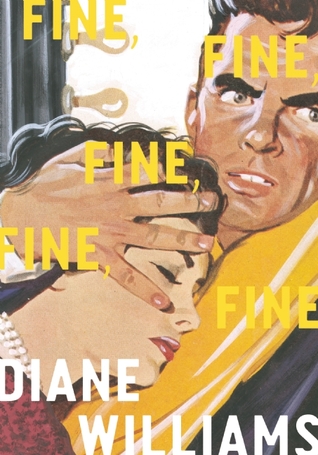
This is a puzzling collection of short stories. Diane Williams’ Fine, Fine, Fine, Fine, Fine assembles 40 short stories–and some of them are very short. Like, 50 words short. Many of the stories seem like they’ve been cobbled together from disparate notes and passages Williams jotted down once upon a time; they just don’t make sense to me and are almost instantaneously forgettable. I actually did like about a dozen or so of the stories, including that very short one, but most of this book just falls apart for me. I hoped that I would like it, as I’ve barely read any flash fiction before, but I just wasn’t feeling this collection. Perhaps I didn’t “get it,” but, in looking at the other reviews on Goodreads, it looks like I’m not the only one. Hey, at least the cover is awesome. I’d get a poster of that and hang it on my wall. Too bad that’s the best part of this collection. 2/5
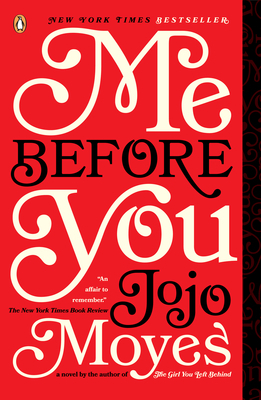
Jojo Moyes’ Me Before You is exactly what you’d expect it to be. It’s melodramatic, cloyingly sugar-sweet, and rather sappy. Even though the novel isn’t a romance, it does try to tear at your emotions–though, it doesn’t succeed for this fella. Instead, it comes off as annoying. (I swear, Louisa Clark cries every few pages. I understand the situation Louisa is in, but maybe I’m just too heartless to be suckered in.) And, speaking of Louisa, her personality is grating. Besides how emotional she is, I cannot understand how she figured her rebound job, with a definite end-date, would end as a prince-finding fairytale with dollops of sunshine and unicorn-ending rainbows. Louisa declares that she’s not as smart as her sister, and it’s clear that she is not.
Nothing in the story comes as a surprise, either; everything’s laid out from the get-go. While I don’t mind an unchallenging book once in a while, I was hoping for some more substance than what’s offered. That’s the book’s biggest weakness for me, and I’m perplexed as to why Me Before You is so beloved. As unsurprising as everything is, Moyes’ writing is at least easy to read and well-flowing. There were no problems at all with reading. Plus, I do like the conversation Moyes’ brings up with assisted-suicide. That’s the novel’s biggest strength for me. It’s a controversial topic, and Moyes does well with illustrating both sides of the argument.
I liked Me Before You, but it’s not the special snowflake most people believe it to be. 3/5

I’ve seen the film version of Isherwood’s A Single Man a few times before and thoroughly enjoyed it, but I knew I wanted to read the novel sooner or later. I finally got around to it.
Isherwood’s novel is slim–it’s under 200 pages–but I don’t feel like anything was rushed or only partially created; it’s a full experience. The story follows a day in the life of George Falconer after the loss of his partner, Jim. We go through his routine, of how he wakes up, how he teaches his classes, how he winds down, how he torments himself, how he tries to live again after such a debilitating loss.
George is a prime example of an outsider, but he is universally relatable. And that’ all because of Isherwood’s fantastic writing. The prose is specific, pointed, and very easy to read. There’s a sense of sadness on every page, but there are also moments of happiness and black comedy. There’s sincerity throughout. Isherwood easily manipulates us and his words tug at your heartstrings. A Single Man was my 26th book this year, and it’s certainly one of the best I’ve read in 2016. 4.5/5

I love Tina Fey. I love what she did on SNL and with my beloved 30 Rock, and so I was pretty excited to read Bossypants. Unfortunately, I feel like much of it falls flat. I did greatly enjoy the (luckily) significant portions that focus on SNL and 30 Rock, but the rest of it lacked the genius writing she so obviously possesses. Perhaps I was expecting more, especially since I loved Amy Poehler’s Yes Please. I do think I would’ve enjoyed Bossypants more if I listened to it on audiobook, which is something that I’ve never done (so I’m surprised I even mentioned it). I could read her humor just fine, but having Fey read her story for me aloud would probably work better. 3/5
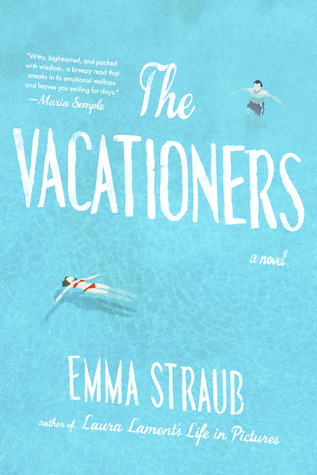
I try to give every book I read a chance, to make sure that there really is something worthwhile. Unfortunately, I was disappointed with Emma Straub’s The Vacationers. Straub’s novel focuses on the Post family–Jim, Franny, Bobby, and Sylvia–Bobby’s girlfriend, Carmen; Franny’s best friend, Charles; and Charles’ husband, Lawrence, on their trip to Mallorca. The story is pretty slim, even for an obvious beach read. Not much happens in the first half of the novel, and when something does happen in the second half, it’s the same problem that’s been referenced before with all of the other characters’ relationships.
In one of my Goodreads updates, I said that I didn’t mind character studies. I’m not sure if the novel even qualifies as such, as each character reacts similarly to the same obstacle they all run into. That being said, Straub can write well. Her writing style is easy-breezy to read; each sentence flows swimmingly into the next. While The Vacationers is short on story, at least it isn’t entirely unpleasant to read. I’m still looking forward to Straub’s next novel, Modern Lovers; hopefully there’ll be a bit more complexity with the characters and story. 2/5
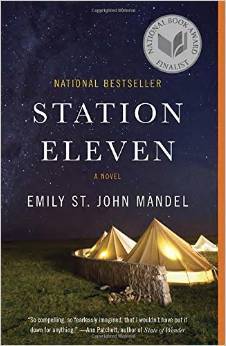
I loved every single bit of this novel. Station Eleven is almost like a perfect episode of Lost.
Emily St. John Mandel’s novel focuses on several characters who all have some sort of relationship with famed actor Arthur Leander, and experience his sudden death, both near and afar, during a performance of King Lear. Just as Leander perishes, there’s an unexpected pandemic of the Georgia Flu and the world’s inhabitants–roughly 99%–die as well. Along the American-Canadian border, some of the survivors of this pandemic, including Kirsten Raymonde, Jeevan Chaudhary, Clark Thompson, Miranda Carroll, and Tyler Leander, among others, must traverse what’s left of this wasteland in order to survive.
Twenty years after the collapse, Kirsten Raymonde belongs to the Travelling Symphony, which is comprised of actors and musicians who travel caravan-style around the Great Lakes to perform Shakespeare and musical classics. Raymonde was in the the production of King Lear and witnessed Arthur Leander’s death up-close. Jeevan Chaudhary leaped toward the stage to help resuscitate Arthur. Clark Thompson was Arthur’s best friend whom he met as a teenager, both struggling to become famous actors. Miranda Carroll was Arthur’s first wife, and created a two volume comic book entitled Station Eleven, copies of which, after receiving them as gifts from Arthur, Raymonde holds dear. And, Tyler Leander–well, I’ll keep him a secret.
The writing is brilliant; Mandel expertly intertwined several storylines and makes connections between the disparate characters, all across decades before, during, and after Arthur Leander’s death and the onset of the Georgia Flu. This is what I mean when I compare the novel to Lost, with all of its intersecting characters and storylines with flashbacks and flashfowards.
I love this book. I really do. I even added it to my favorites shelf before I finished reading it. It even comes close to my most recent book-love, A Little Life by Hanya Yanagihara, which I read at the end of last year. Try Station Eleven. You won’t be disappointed. 5/5
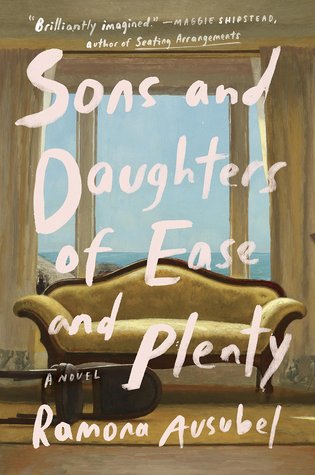
Ramona Ausubel’s Sons and Daughters of Ease and Plenty, which streets on June 16th (I was able to obtain a digital ARC through Penguin’s First to Read program), is an entertaining literary read. The story focuses on Fern and Edgar Keating, their parents, their children, and the unraveling effects all parties endure after their financial floor suddenly vanishes beneath them.
Many may dislike Fern and Edgar, and I can see why. But I wonder whether or not we would act the same if something so comforting–and, let’s be honest here, money is a comforting object, whether or not we believe in just how good or bad it is–were to be swept away so suddenly. Fern and Edgar, like their money, vanish into their own stories, leaving their children alone for a week. The children–Cricket, James, and Will–seem content with their parent-free lives; worry only settles in toward the end of the week, but then Edgar comes home. Fern travels with a giant, Mac, to recover his son. Edgar sails away with his lover. Both discover their terrible mistakes and return to the safety and comfort of their home. While they’re still penniless, a new familial, rather than financial, comfort blossoms.
This story crosses many generations and several decades. Themes of family, self-worth, love, friendship, heartache, death, loss, and realization all play major parts here. Ausubel’s writing is descriptive and inviting; I wanted to continue reading her words. I’ll definitely have to check out Ausubel’s other novels. 4/5

Karan Bajaj’s The Yoga of Max’s Discontent was apparently well-received in India, and, upon its upcoming release in English, I can see why. Bajaj’s characterization of his main character, Max, is vivid and realistic, at least for the most part. Max, completely distraught by his mother’s death, desires more out of life, or at least a better understanding of how to live and what to believe. So, he journey’s to India to find a guru and practice yoga, to rid himself of his discontent. I generally enjoyed reading Max’s exploration of life.
There were two things that I did dislike though: one is minor and the other major. Bajaj does seem to jump pretty suddenly between different settings, both geographical and chronological. He very suddenly leaves New York and finds himself, somehow completely comfortable, in India. Max, after several chapters and just a few months spent at an ashram, has then suddenly spent three years of his life there. The pacing just seems a bit off. The other, bigger problem I have is Max’s blatant disregard for his physical health. I understand that, in his yoga practice, his mental prowess and his ability to remain calm and completely focused on his path to transcendence is the central goal, but you can’t really transcend if your body withers away. This dissonance may just be because I’m not overly familiar with this practice, but I just can’t get over that.
Even with these two problems, I did really like this novel. It’s a relatively fast and easy read, and it does make you think about your place in this world and your spiritual life, I guess. I’m usually not one to read books that discuss the best way to live your life, how to take care of yourself spiritually, and all that, but I did enjoy Bajaj’s novel. I wouldn’t necessarily classify this as a religious novel, but rather a spiritual one. 3.5/5

The Cuckoo’s Calling – Robert Galbraith
Robert Galbraith (aka JK Rowling) has given us an entertaining, fast, and fun read with The Cuckoo’s Calling. This novel, the first in the undeniably cool-sounding Cormoran Strike series, tracks the apparent suicide of supermodel Lula Landry. Former military and current private eye Cormoran Strike, along with the help of temporary secretary Robin, interviews a series of individuals associated with Landry–fellow tenants, friends, family members, employers, etc.–and discovers that her suicide may in fact be a murder. While the result of Strike’s investigation isn’t necessarily all that creative–I may have figured it out rather early on–the writing is so inviting and easy to read that I wanted to see where the story went and how Strike would solve this crime.
I don’t read too many mysteries, so the only other novel I can really compare it to is Hammett’s The Thin Man, which I read in March. Hammett’s novel is certainly more complicated, and you can easily lose track if you don’t pay attention. That’s not really the case with The Cuckoo’s Calling, but that’s okay; I have no qualms with that. In fact, the only qualm I do have–and it’s quite minor–is that, for a mystery novel, it seems light on action. The climax of the story, of course, has some action, but the bulk of what’s here consists of interviews. I’m hoping there’s a bit more action in The Silkworm. Overall, though, this was an immensely readable and fun story, and I’m excited to see where Galbraith takes us next. 4/5
Between the World and Me – Ta-Nehisi Coates
I don’t freely hand out five stars to books; they must truly astonish me and impact me in ways which can only be described as profound. Ta-Nehisi Coates’ Between the World and Me is such a book–“required reading” as the great Toni Morrison states. I find it hard to review this book, to eloquently put it into words. This is a letter to Samori, Coates’ son, and this letter delves into the author’s existence as an American with a black body, a body that must continuously struggle. Coates details his experiences with his family, attending Howard University, meeting his wife, losing friends, and feeling the chains that are still present in the current American culture.
It’s no wonder why Between the World and Me won the National Book Award. For it’s timeliness and effectiveness, this is something that I think should be read by as many people as possible. It’s importance is something that will only grow in time. 5/5
The Book Thief – Markus Zusak
I wonder what compels us to read so much World War II literature. Are we still so fascinated by a not-so-distant past, where such monstrosities occurred, that we see this literature as both unfortunately possible and yet so indescribably irresistible? Are we able to willingly be dazzled by such atrocities? Are we able to see past the terror when reading through the veil of a book, especially if it’s a work of fiction? Do such manifestations make these events–real or fiction–more digestible, more palatable, more welcoming? Do they give us a better, clearer understanding of the past? What if the author wasn’t present? I’d say yes to all of these.
On it’s tenth anniversary of publication, I finally got around to reading The Book Thief. I’m not sure where I was, or why I’m so late to the party, but I did finally read it. I was surprised by how much I enjoyed it. I knew relatively little about the novel–only that it was set during World War II in Germany and that there’s a not-so-impressive movie adaptation. (Though, I still do want to see it.) Liesel Meminger has had a rough life. The war has begun and she’s already lost a number of things she holds dear. However, when she rescues a book–well, she steals it–she finds a new journey to begin. A number of obstacles come her way, but Liesel persists and continues her book thievery to survive. Not everyone can survive, however. Even though there are such glints of happiness, ultimately that cannot be the norm for Liesel.
Zusak’s writing is generally easy to read, and there’s a nice ebb and flow to the story. The characters are defined well. My biggest complaint that I have is the narrator, Death. He’s kind of annoying and reveals too much information. He gives up the ending a number of times. Yes, I understand that this is a YA novel, but I think we can read between the lines. We don’t need to be spoon-fed here.
I studied abroad in Germany in 2013. My courses focused on literature with themes of authority: being suppressed by it, abused by it, overcoming it, and dealing with its circumstances. I read such works as 1984, White Noise, Slaughterhouse-Five, Never Let Me Go, One Flew Over the Cuckoo’s Nest, and others. And I’m curious, after having read The Book Thief, why we never read it. Perhaps it was too juvenile. Perhaps Liesel’s acts of book thievery were too subtle, too small, to be considered rebellious. I don’t know exactly. But, I am glad I finally got around to reading Zusak’s novel.
While in Germany, I did visit the Buchenwald concentration camp. It was completely snowed-out; you could barely see five feet in front of you. I distinctly remember a large group of elementary school children laughing, playing, loudly calling to each other. Everyone in my group was completely silent, and I was unable to understand why these children were acting the way they were. Perhaps they were just children and didn’t understand, but I don’t think that’s true. I feel like it shouldn’t be, anyway. To this day, there’s still some dissonance there: a group of children laughing and playing on the grounds of such torture and death.
I think I have a different mindset when I do read World War II literature and non-fiction books. It’s one thing to read about these experiences from afar; and, yes, this novel can be and should be read by as many people as possible, as it’s an important book. However, once you’re there, in the midst, with history facing you from all sides, it’s difficult to not be changed and read subsequent works in a different light. The horror that is somewhat-lightly touched upon–or, perhaps, not so gruesomely detailed–was in the back of my mind throughout my reading. 4.5/5
The sky
holds lonesome nocturnes
twisted together
from unraveled clouds and
fallen stardust.

What a lovely book. This is my second time reading through Murakami’s Norwegian Wood, and I’m still struck at the simplistic, straightforward nature of it all. Once again, Murakami transformed himself from the wacky (A Wild Sheep Chase) and bizarre (Hard-Boiled Wonderland and the End of the World) into a deeply meditative, personal, truthful story about loss, love, and growing-up. It’s a shame that, upon its initial release and worldwide praise, Murakami was unresponsive to all of the attention the novel received. I guess I can understand why he didn’t initially want to be remembered for this simple (yet stirring) love story–especially after reading some of his other works–but I also think I’d enjoy the praise. For me, though, Norwegian Wood is a clear winner, and it remains my favorite work by Murakami (though, I’ve only read his first five novels, so this may change, especially when I get to the beloved The Wind-Up Bird Chronicle and 1Q84). 5/5
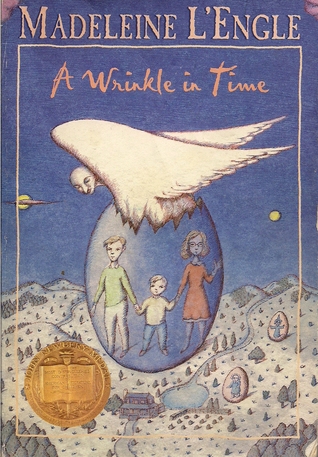
Sheer magic. Truly. I mean, it really is. I first read A Wrinkle in Time when I was 8, and I loved it then. I was enraptured by all of the science, the magic, the fantasy, the love the story was imbued with. And now, 16 years later–with multiple reads in-between–I still love it. Sure, some messages are now clearly obvious, but I still love it. Call it nostalgia. I don’t know. I doubt I could ever dislike this novel. Plus, the copy I read at 8, yellowing and issuing that wonderful old book smell, is the one I read. I’m so happy that I chanced upon this book during an elementary school book fair because A Wrinkle in Time was the singular book that sparked my love for reading. Madeleine L’Engle created something extremely special, and I am so grateful that she brought this story to us. 5/5
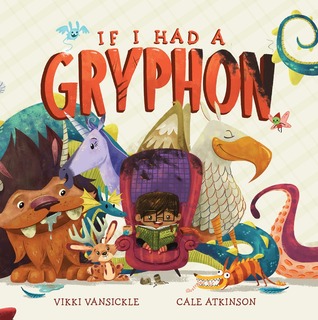
If I Had A Gryphon is a fun little picture book about a girl who, at first, is uncharmed by her ordinary hamster and imagines how great it would be to have a mythic creature as a pet. While she goes through a wide assortment of cool beasts, she comes to a conclusion that may surprise you. It has some neat illustrations by Cale Atkinson, too. I don’t normally go around reading picture books–that’s not really my style–but I work at a book store, and, as I set this book up for a new promotion, I thought, “Eh, why not?” 3/5
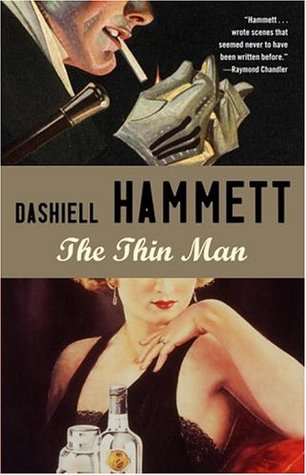
Dashiell Hammett’s The Thin Man is a satisfyingly sharp, complex, and often hilarious hard-boiled detective story that’s certainly worth a read.
The story follows two alcoholics, Nick and Nora Charles, a married couple that just happens to get caught up in solving a mysterious murder spree. Nick, a former detective, immediately sees interest in the Wynant family, and it appears that the patriarch, and former client, Clyde, has gone off on some murderous rampage. His ex-wife, Mimi, and two children, Dorothy and Gilbert, are altogether caught up in their relative’s circumstances, too. Shade is thrown all around, and not everything is as it appears to be; only Nick and Nora–well, mostly Nick; the socialite Nora spends most of her time consoling Dorry and making cocktails and snide remarks–can solve the case. Hammett has some great one-liners sprinkled throughout, which makes this somewhat convoluted plot much more digestible*. The Thin Man is a wild ride, and I’m all the more curiouser to finally read Hammett’s The Maltese Falcon after reading this and seeing the 1941 film several times. 4/5
It’s no wonder that this novel was turned into a film, an almost precursory film noir, but with a healthy smattering of humor.
* “‘What do you have to do to get a drink?’ I said: ‘You have to walk over to that table where the ice and bottles are and pour it.'” & “Dorothy, behind me, said, ‘Balls!’ under her breath, but with a lot of feeling.”
Roman stoked the fire, adding a log for the flames to gobble up, which they did rather happily. The room felt stale, murky, and the faun thought to change the atmosphere.
A large record player sat next to the fireplace—somehow Calvin had missed it before—and the faun sauntered over to it and put something on: Florence + the Machine’s How Big, How Blue, How Beautiful. Calvin thought: At least the faun had good taste. Roman replaced the record’s jacket onto a wide shelving unit that had quickly appeared from somewhere in the darkness.
“Now, drink your tea,” Roman told the boy, “and I’ll tell you why you’re here.”
Calvin took the cup of tea and sat down in one of the chairs next to the fireplace. It was more comfortable than what he thought it would be, with all of his breaking wicker and a lumpy, grayish pillow. This place was full of surprises, unexplainable illusions, magic. The cup was hot in his hand. He took a sip and it warmed him through. Literally. His matted hair and soggy clothes dried with the sudden heat wave.
“Sorry. No saucers,” Roman told Calvin as he loosely clutched the teacup. “I’m not that proper.” Though, Calvin questioned his sincerity in this apology; he certainly didn’t sound too sincere.
“I don’t mind,” he responded. “Where are we exactly?” Being left in the dark on this point worried him, made him anxious. If he traveled through time, then he surely wasn’t anywhere near home.
“The where isn’t exactly as important as the when,” he replied, “but I shall tell you anyway.” Roman took a long sip of his tea and nestled the cup back in his hands, the warmth tingling his somewhat furry fingers. “We’re in something of a safe house in a land known as Aryashi. On the planet Uriel. We’re far away from your earth, Calvin, but Aryashi is not unlike what you’re used to. In fact, you may find it to be a place of hospitality and comfort. The people are usually kind, friendly, what have you. Water falls from the sky and finds itself in streams and lakes; deer, eagles, whales, all sorts of creatures inhabit the place. Just like on your earth. You may even find some creatures you’ve locked away in your imagination. There are some fantastic beasts in Aryashi. Rather interesting, yes.
“However, Aryashi is not all it appears to be. Just as you may find comfort, you might find discomfort. Here’s why: there’s a vile, melancholic demon on the outer edges of this place—a twisted, dark shadow, you could say—and it’s coming ever closer toward us. This has happened before, mind you, but never to this extremity. Most of us Aryashians are horrified. A few are optimistic. Those of us with a bit of that confidence have brought you here in hopes that you could remedy this ugly phantom. We believe you can help.”
“We?”
“Yes, we.” He nodded.
Roman paused and took a breath. Calvin noticed the faun’s hands trembling around the teacup, slides of the liquid running over the edge. He wasn’t sure if Roman was a horrified Aryashian or an optimistic one. Time will tell, he said to himself.
The record had long stopped—the last notes of “Mother” dispelled quietly into the thick air—and a low, scratching hum dulled the room. The faun stood up to change the record, and, before Calvin could protest, the conversation. He’ll learn soon enough, the faun thought as he sat back down.
“Now, for the time being, you are currently restricted to this safe house. No exceptions.”
“But why?” Calvin asked. “What am I supposed to do cooped up in here?”
“Well, you need to acclimate to your surroundings. And, for your safety, I guess. I assure you, your detention to this house is only temporary. A few days at the most, mind you.” Roman took a last sip of tea. “And, there are plenty of things to do in here. I’m sure you’ll find a way to pass the time.”
“Is it really that dangerous out there?”
“More so than you would think. While Aryashi holds a multitude of wonders, there are also some great perils, least of all this impending demon. You’ll find that the mountains and rivers are riddled with things nearly unimaginable.”
Calvin looked around the small space, trying to gain some semblance of reality in this place. He tapped his foot against the stone floor, which echoed in a brusque rhythm. Roman said, “Please do excuse the mess. I’m not in charge here, but I guess its appearance is my fault. The house has fallen a bit into disrepair. Shambles. It’s sad, really.”
Calvin looked at the faun. “It’s actually quite nice,” he said. “Cozy. More comfortable than I expected.”
“That’s a polite thing to say. Still, it’s trashy. But it’s home. Well, not really. I don’t live here.”
The record spun around and around, playing the Beatles: “Hello Goodbye,” “Strawberry Fields Forever,” “Penny Lane,” “Norwegian Wood.”
“You like an array of music, don’t you?” Calvin asked the faun. He himself was a fan of the 60s, having grown up listening to it. He could spend hours listening to Elvis Presley, Dusty Springfield, Gary Puckett & the Union Gap, The Righteous Brothers, Petula Clark. He started humming “Downtown” against the melodious beats of “I Want to Hold Your Hand.”
“The 60s were one of the best times in music. And, Florence just has it, you know?” Roman went over to the bookshelf and pulled a few books off to lend his new acquaintance. As he handed Calvin the books, he said: “These will certainly help. But if you bend even a single page, tear it, mark it, breathe on it in any foul or otherwise ungrateful way, you will wish we never brought you here.” In addition to A Wrinkle in Time, Roman gave Calvin pristine-looking copies of Atonement, The Tempest, and The Namesake. Calvin had heard of them all, but hadn’t ever read them. “Read over these while you’re staying here; you should be able to get through them.”
And with that, Roman walked over to the record player, stopped the Beatles, and entered the shadows of the far wall, appearing to have disappeared completely, leaving Calvin to lonesome.
He looked at the covers of the books and then promptly set them on table next to the copy of A Wrinkle in Time. Only the noise of the fire and the words on those pages could keep him company. Well, and his thoughts, but those were always scary. Nothing like the vast mysteries of the universe to keep one’s mind preoccupied.
And then, a tiny, animated black ball of soot rolled out of the darkness, somewhere by the far side of the bookcase, and nudged itself against Calvin’s left foot. It gave off a happy crackle and spun around on its head in glee. It had bright eyes, which it slowly blinked, like a baby trying to focus in on the world. Roman hadn’t mentioned anything like this, and he gasped in surprise. Several more rose out of the darkness and gathered around this new stranger, their crackling laughter bouncing on his shins. I guess I won’t be alone after all.
The stars blinked kindly; the dusty luminescence swayed above his head. A small fire burned at his feet, blazing around and licking up the deadened logs of ash. The grass was sweet, puckered in the chilled night, and the distant hymns of nightbirds barely rang through the muddied air. A tent was pitched, its patchwork of colors bruised in the absence of sunlight.
He twiddled a stick between his fingers. The bark was coarse and uneven, cold. The humble firelight bumped up on his face and neck, which grew warm from the heat. He was bundled in a thick coat of dark feathers, hoping to defend against the coldness promised by the others. Though, surely, he thought, it would get much warmer.
He pitched himself upon a cliff, a rocking lake below, a forest behind him. The fire cursed, shouting gravely at him, but he paid no attention. The flames’ crusade was beneath him. He had other concerns.
Dew had lain itself upon the grass. The moon—blank, deserted, crumbling—quivered amongst the stars, fearful to be completely extinguished. The waves of willows’ leaves spun in the air and on the ground. The fire acted again, incorrigibly. It was becoming a nuisance.
A reserve of water sat at his feet and he killed the fire. Thick smoke rolled through his nose and eyes, staining his clothes and ears. A violent sizzle fizzled out. The stars grew brighter as another source of illumination vanished into night. The wind in the willows blew around the encampment, and he felt a sudden rush of something. He couldn’t think of it, this emotion.
The words flew about within his head; they were simple, but effective, easily remembered. They only had one destination, and tonight they would be used accordingly. The words possessed much more than he could imagine, and, yet, he was not frightened by this. Or, perhaps, he merely put it out of his mind. He simply hoped nothing would go awry, that no chime of guilt would echo in his bones or blood, make him long for what once was. He needed this.
“Sertaqa iza,” he spoke to the night. His feathers elongated, the wings on his back ascended; he flew up into the air to watch the stars die and fall to him.
He watched as, one by one, the kind lights jolted from their atmospheres, where they had so lovingly clung, and tumbled downward in mesmeric spirals. His pursuits succeeded, and he smiled. A wind bellowed. The stars stung the black sky with their array of colors, streaking it. The moon shied away, turning herself into an invisible nonexistence.
The first star bounded to him and he clutched it between his two hands, his fingertips gripping the molten, luminous sphere; it was heavier than he thought. Though seemingly afire, the star did not singe his skin or curl his feathers. He pressed his hands against the star and condensed it, molded it into a slighter, more perfect orb. It burst into color, rapidly transforming from white to a lustrous sapphire.
And with it, he placed the glowing sphere into his mouth. It crackled as it met his tongue, his saliva reacting to such a foreign object. The star tasted of ash, blood—almost putrid, but somehow satisfying. He savored the lingering flavor as the soft sphere coalesced with his body. It found its way through his esophagus and into his stomach. A blistering feeling erupted, and an immediate desire to vomit. Yet, he silenced the urge. As the star swirled, it relocated to his chest, through the lungs, and made residence in his heart. It stiffened and bled out, trickling down into his blood.
A second star met his hands, and he ate it, too. Then a third, and a fourth. Piles of stars plagued the cliff he hovered above. He would continue his meal throughout the oncoming days.
The moon turned around to look at this damned occurrence. She squealed with rage, but sought no revenge. For what could she do? The last of the stars amassed itself upon the bodies of its brothers, scarcely gleaming. He floated down, wings scraping the air, and nestled himself amongst the stars.
A blackness had devoured the sky.
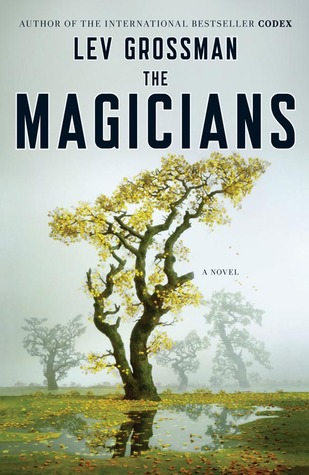
What a marvelous book. I’m not much into science-fiction or fantasy, but I thoroughly enjoyed The Magicians. It’s a grown-up, modernized mash-up of Harry Potter and The Chronicles of Narnia, and I loved every minute of it. Quentin Coldwater travels to Brakebills College for Magical Pedagogy, where he meets Alice, Eliot, Janet, Penny, and a slew of other magicians as they tackle and refine their abilities. Scattered throughout the novel is a series of books set in Fillory where the Chatwin children visit. And, just maybe, Quentin gets to visit, too. A truly great, witty, fun read. Lev Grossman’s prose is a delight to read. I’m so glad there are two more books after this because I never want to leave this world. 4/5
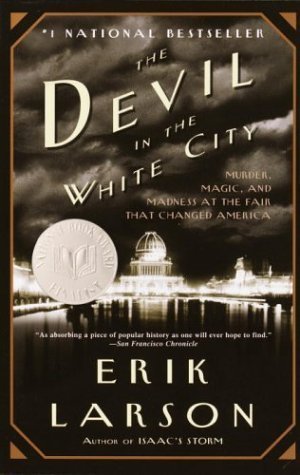
Anyone who follows me on Goodreads knows that I had trouble with The Devil in the White City. I’m still really quite torn. There were elements I liked and there were elements that left me completely uninterested. The biggest problem I have is that there are two, in all reality, separate stories that don’t really go together. On the one hand, we have Chicago’s World’s Fair: it’s planning, creation, operation, and aftermath. On the other hand, we have the story of H. H. Holmes: murderer. Everything about H. H. Holmes is fascinating. Everything about the World’s Fair is generally boring; I just could not get into it. Unfortunately, nothing really clicked until the midway point, and the only reason I finished the book was because I had already invested so much time into it and so I might as well have finished it (in addition to larger sections dedicated to Holmes). There is a singular mention of Holmes attending the Fair, and that’s it. That doesn’t work for me. That’s not enough. Larson’s writing is good, but even he can’t spin the “connections” between the two stories. I would much rather have read a book just on Holmes, with the World’s Fair simply being the setting. I really don’t have any desire to ever read it again. Though, with a film adaptation coming up, I will say I’ll watch what Martin Scorsese and Leonardo DiCaprio come up with. 2.5/5

My Murakami Marathon continues with his fourth novel, Hard-Boiled Wonderland and the End of the World. This novel is wholly unlike any of the previous Murakami novels I’ve read; it truly cannot compare. There are two interlocking stories here. Hard-Boiled Wonderland follows the path of an unnamed man who meets a mystifying Professor and his granddaughter and gets caught up in the “shuffling” of information, discovers his past, and plans for the future, all wrapped around a rather unique mystery. The End of the World follows the path of an unnamed man who is stuck within a walled town, aptly named End of the World, and becomes the Dreamreader, someone who reads information-laced particles of light that emanates from skulls.
Part detective story, part post-apocalyptic utopia (though, of course, utopia it is not), wrapped in post-modern dreams and themes. It’s a truly bizarre book, but Murakami’s strength lies in his description and the juxtaposition of these two connected stories. Every page was truly interesting and captivating, mesmerizing. A seriously good read. 4/5